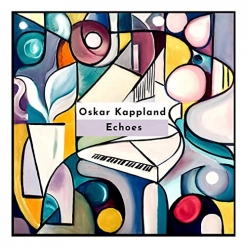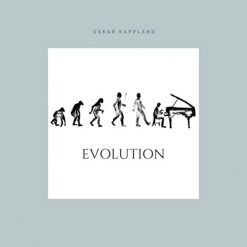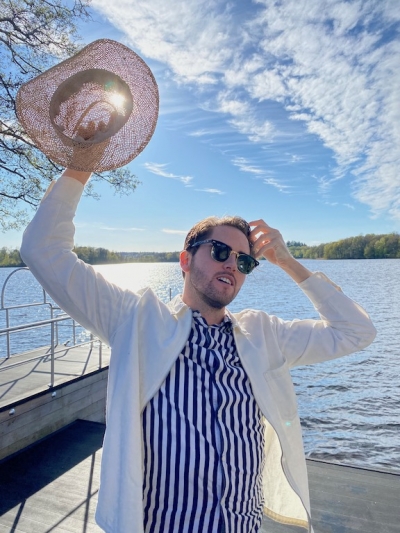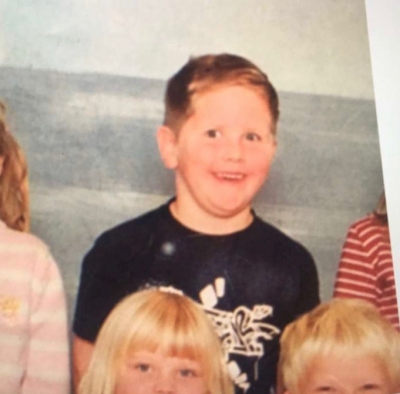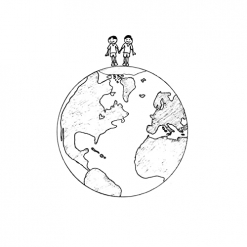One of the things I’ve really been enjoying about reviewing lately is that more and more artists are finding me from other parts of the world. Oskar Kappland is a young pianist/composer from Sweden, and I recently reviewed his EP called
Vintergatan. Still in his early 20’s, Oskar has traveled much of the world, and his music has a real maturity about it. I really enjoyed getting to know Oskar better via this interview and predict that he has a very bright musical future ahead of him! I’d like to introduce you to Oskar Kappland!
KP: Hi Oskar! Where are you calling home these days?
OK: Hi Kathy! I’ve been at home in Sweden since mid-March. Let’s just say that the place I left to get here in the midst of Covid-19 was a tad bit warmer!
KP: I bet! Where was that?
OK: Bali, Indonesia. It’s a very special place to me.
KP: I don’t know very much about that part of the world. What makes it special?
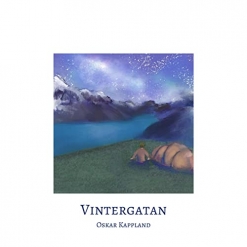
Click on album cover to go to
Kathy's review.
OK: Mainly the kind of people it attracts from around the world. I’ve specifically been spending time in Ubud, a town in the middle of the Balinese jungle, and the place is just filled with incredible people doing incredible things. Everyone you meet has a unique story, be it in business, personal development, creative professions, or spirituality. There is also a huge focus on health and wellness, which makes living a healthy lifestyle very effortless. It’s altogether a very inspiring place.
Side note, Ólafur Arnalds, one of the greatest neoclassical composers in existence, also loves Bali and calls it his second home!
KP: Congratulations on the release of your newest album, Vintergatan! I really enjoyed reviewing it recently and hope it’s doing well. What does the title mean?
OK: Thank you so much! I was blown away by your kind review. Vintergatan is the Swedish word for our home galaxy, The Milky Way. Literally, the word translates to “Winter Street.” I love a good play on words (the people in my hometown, Gothenburg, are actually nationally renowned for their puns!), and this title is no exception. The Milky Way is our home, and within that home, the cold, wintery country of Sweden is mine. You could say that I live on Winter Street… This album is a tribute to coming home after being on the road for a long time.
KP: It sounds like the album was recorded on an older piano and mic’ed so that the inner workings of the piano action can be heard. It’s more apparent on some pieces than others. What’s your recording process?
OK: You’re right, the piano is an old piece that my mother-in-law received from her aunt many years ago. My partner and I are currently staying at his mother’s place, and this is the piano I’ve been recording on. It’s an August Hoffman, an old Swedish brand. Capturing the piano sounds, squeaks, cracks, etc. is practically unavoidable! Particularly when playing quieter songs. I like the character it adds to the pieces, but I definitely wouldn’t turn down an offer to play on a less noisy piano when the time comes…
KP: What are your favorite tracks on the album?
OK: "Many Small Streams Make a River" and "Förgätmigej" are my two favorites. They have the most interesting melodies and the latter is filled with harmonies I’d never tried before. I love serendipitous moments by the piano when all of a sudden you discover a new sound you’ve never created before.
KP: I love your arrangement of “Who Can Sail Without the Wind?” It’s a Swedish folk song and has a haunting, melancholy melody. How and why did you choose this song to close Vintergatan?
OK: To be honest, there was no way I could make an album about coming home without including this tune on it. I used to sing it with my father when I was young and to me, it’s the epitome of a melancholy Nordic folk song. I just love how it manages to rip my heart straight out of my chest and comfort me to sleep at the same time. Like, what other song does that?!
KP: It’s such a beautiful song! How many other albums and singles have you released?
OK: Vintergatan is my third album, albeit a shorter one. Since it’s only seven songs long, I refer to it as a mini album. My previous full-length Echoes (2019) was the first album I recorded with real equipment. You could also say it was the first time I knew at least remotely what I was doing, ha ha! My first album Evolution (2018), I recorded on a USB plugged-in narration mic in Japan while doing an internship there. I was 21 then and had absolutely no idea what I was doing; I didn’t even know what “mastering” meant or that you were supposed to do any sort of post-recording work on the music. But you know, Kathy, what matters is I did it. I took action. I knew I loved composing music and I was pretty sure I had a knack for it, so I didn’t let my lack of technical knowledge get in the way. I’m so grateful for that now, because although the album isn’t great production or audio quality-wise, it got me started on this journey. And who knows, there might be an improved rework of Evolution coming out in the future if there is popular demand for it!
KP: I agree that the first step is the most important!
The popularity of recording and performing on “prepared” pianos seems to be especially strong in Europe. Do you have any idea of why it’s become so popular?
OK: I think the felted piano in particular has become such a popular sound because it’s so conducive to Spotify playlists centered around focus, sleep, and relaxation. Adding a felt band between the hammers and strings cuts out the high frequencies and makes the sound more subdued and less attention-grabbing. In my opinion, I think the rise of the felted piano is slowly strangling the neoclassical genre and placing it in a minimalistic box. It’s not necessarily the felt per se, I do enjoy that sound too, but it’s the whole minimalistic direction in which it’s taking the genre. You’re rewarded for “not being noticed,” for developing your melody as sparingly as possible and just to act as someone’s background material. Imagine Ludovico Einaudi releasing his
Nuvole Bianche today. It would have never received the amount of attention it did in the 2000s. I think that’s incredibly sad. I want to allow the piano to be grand, because it sure is a grand instrument! Experimenting with different sounds is terrific, but solely conforming can be very limiting. I hope there will be other incentive structures soon for modern classical pianists to create works that dare to be bold.
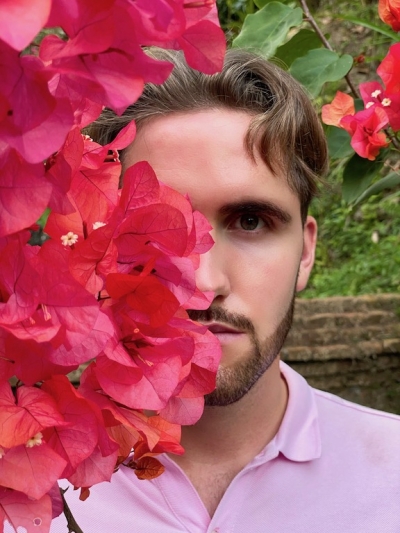
Oskar and Bali flowers
KP: That’s a really interesting point and makes total sense. I have found it discouraging and somewhat frustrating that many of the really accomplished pianists are often overlooked because their music doesn’t sound like everyone else’s or is too “big” and dramatic. I think there is room for both quiet and powerful styles of music within the genre(s) and hope the music world will be more welcoming of dramatic music that you actually need to listen to rather than simply letting it fade into the background or lull you off to sleep.
OK: Absolutely. There is and should be space for all kinds!
KP: You mentioned to me that you had spent several years traveling. Why such a long period of travel and where are some of the places you visited?
OK: That’s correct. My boyfriend and I have been traveling and/or living abroad since the summer of 2016, the year we finished high school. We’d been traveling as much as we could throughout school but it was during our gap year that we really started going far and wide, traveling to places like Peru, South Africa, Thailand, Oman, India, and China. We then started school together again at a newly founded University based in San Francisco. The beauty of the program, though, was that we’d live in seven different cities around the world. Hence, we lived in San Francisco for a year, after which I spent the summer at my internship in Japan, and then moved to Seoul, South Korea for our third semester. After that, we both started questioning why we were still in school when we each had our passions we wanted to focus on (many people reading may already know my partner as Nonstop Dan on YouTube). So after two years at university we decided to put our formal education on hold and let the education of life rule once again. For the past year, up until mid-March 2020 when the ripples of the pandemic were starting to grow more quickly, we were traveling again, going to slightly more off-the-beaten-track places like Rwanda, Uganda, Kuwait, Myanmar, Laos, and Taiwan. Although our plans were cut short by Covid-19, I believe it was good for us to come home and rest for a bit. We’re very grateful that we can do so thanks to the tireless work of our governments and health care workers.
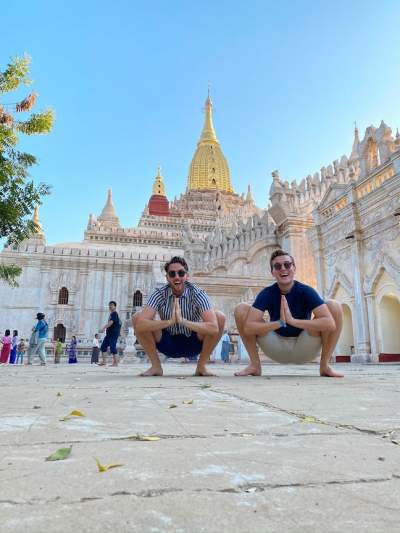
KP: Do you plan to “hit the road” again for an extended period of time?
OK: As soon as it’s safe to do so, you bet!
KP: Let’s talk about your background. Where were you born and where did you grow up?
OK: I was born and raised in a small town just south of Gothenburg, Sweden until I was 16. That’s when I decided to take my first step into the world and move to the United States as an exchange student for a year.
KP: How old are you right now?
OK: I just turned 23. It’s a pretty weird age to be a composer, because you’re too old to be a prodigy and too young to be taken seriously. I don’t let that hinder me, though, it’s a good reason to work twice as hard to prove your worth!
KP: Well, like we said before, you have to start somewhere and this seems like a great time for you to dive in.
OK: Couldn’t have said it better myself!
KP: When did you start playing the piano?
OK: I think I always played it without really knowing what I was doing. I grew up with a toy keyboard in my room and started composing intuitively before I even knew the names of the keys or knew how to play a C-major scale. Some of the melodies on my first album Evolution actually stem from melodies I created in that childhood room.
KP: When did you start piano lessons and how long did you take them?
OK: I took lessons from third grade until the end of fifth. I progressed quite quickly and received additional training from my teacher. But at the end of fifth grade, sadly, I discovered “it wasn’t cool” for a boy my age to play the piano, so I quit. Sometimes, I look back at that decision and wonder where I could have been today had I continued, but if there’s anything I’ve learned in life, it’s that regretting and worrying are both like being in a rocking chair: they give you something to do but don’t get you anywhere.
KP: I really like that analogy! When did you start writing music?
OK: I began composing for real when I was 20.
KP: Do you compose pop music as well as solo piano?
OK: Absolutely! My initial goal was actually to become a songwriter and I never thought I’d pursue solo piano before I’d established myself in pop music. Now that I’ve instead started establishing myself as a composer, I’m excited to start working more on my songwriting side too. I’ve released two pop songs under my own name so far, collaborating with two vocalist friends in Malaysia and New York. My next goal is to write a bunch with Zara Larsson and the ultimate dream is to collaborate with my queen Ariana Grande.
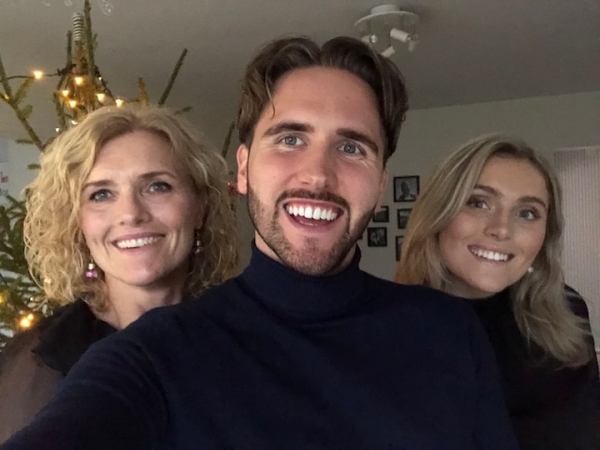
Oskar with his mother and sister.
KP: Is your “pop” name different from Oskar Kappland?
OK: It’s not. I want Oskar Kappland to be known as a well-rounded creative. There is more to me than solo piano. For any creative work I take on, I want it to bear that name to account for all the dimensions of my creative expression.
KP: Good plan!!!
I read that your father committed suicide when you were still in your teens. What a horrible thing to have happen. Has music helped you cope with that loss?
OK: It definitely has. It’s really the only coping mechanism I had. Our relationship was not the best, so I had a lot of different emotions that needed to be cleared from my teenage years. My piece Tell Me Where You’ve Been is about a hypothetical encounter with my father after his death, one in which we’re finally able to sit down and talk like adults. It was certainly very cathartic to channel my feelings so strongly through that song.
KP: Are there any other musicians in your family?
OK: If there are any, I could probably count them on my right hand! I know my great grandfather played the accordion, but that’s about it. I look at it as a blessing in disguise, though, because there’s no better way to learn than to have to figure things out yourself.
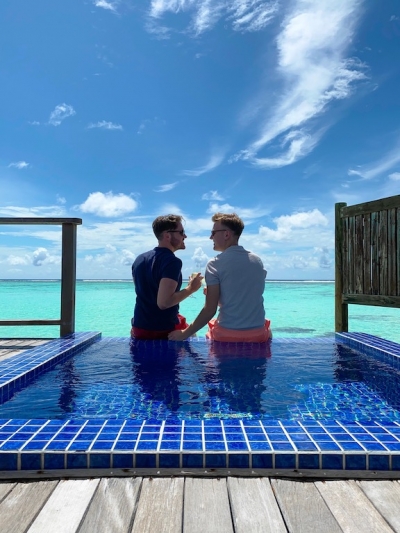
Oskar & Dan's 5th anniversary.
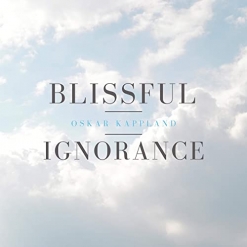
Cover artwork for "Small World" and
"Blissful Ignorance" singles.
KP: I agree!
Who and/or what do you consider to be some of your strongest musical influences?
OK: I draw inspiration from every genre from pop to classical. For piano music specifically, my biggest inspirations are Beethoven, Einaudi, Alexandra Streliski and Nils Frahm, although recently I’ve started listening more to Chopin.
KP: Are you still releasing one new song every week?
OK: Not right now, although I’m seriously looking at doing something similar again. Having to put out a new track every week was perfect to get over my otherwise prevailing perfectionism and calm my nerves around each release. This is also when I released my so-far most successful single Blissful Ignorance, so I definitely believe there is something special about pushing yourself creatively like that.
KP: Do you perform in concerts very often?
OK: I haven’t played a serious live concert since when I took lessons in fifth grade, but I would definitely love to do so as soon as there’s an opportunity. I have just recently begun doing livestream concerts via Instagram (@oskarkappland), though, which has been great practice. Experiencing music live is so different from listening to studio versions, so I really want to give my followers the opportunity to do that.
KP: What is your most exciting musical moment so far?
OK: Probably releasing the vocal song “Small World” for my and Dan’s 5-year anniversary and having the song be featured on New Music Friday Sweden as well as a few other lists. It was amazing to get that kind of “thumbs up” on the first pop song I made public.
KP: Congratulations!!! On a slightly different track, if you could have any three wishes, what would they be?
OK: Other than eternal world peace? If I were to sum them all up in one, it’d probably be this: the ability and assurance to do anything I want whenever I want. Being an independent musician already comes pretty close!
KP: Are there any other projects you’re working on right now?
OK: I’m currently working on a collaborative project with a few other artists. It’s very important for me to highlight the diversity in the neoclassical field, which is why I’m inviting many underrepresented minorities to be part of the project. In short, the intention is to create a highly durable body of work that will stand the test of time while showing the world how multifaceted our genre is.
KP: That sounds really intriguing! I can’t wait to learn more about it!
OK: Thank you so much for your time, Kathy! It was great to chat.
Many thanks to Oskar Kappland for spending some time with us! To learn more about Oskar and his music, be sure to visit
his website and his
Artist Page here on MainlyPiano.com!
Kathy Parsons
May 2020


